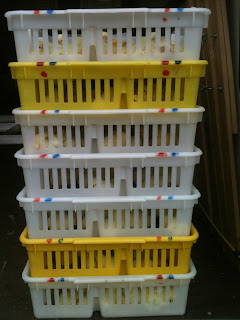So you purchased fresh yummy vegetables what do you do with
them when you get home?
Produce storage can mean the difference between super
healthy eating and eating dried out life devoid produce. In my business I have found that what
happens to the produce immediately after it is picked is just as important if
not more than how it is grown. I
am a stickler about caring for the vegetables because I want to make sure that
the energy of the plant is still there when the consumer eats it. Nutrition and energy is why we are
eating produce anyway.
Greens should always be refrigerated and prefer temperatures
around 32 degrees. Our
refrigerators are mostly around 40 – 45 and this is fine for a week or so. As much as I dislike plastic I have
found no better way to store my greens.
At the farm the greens are picked early in the morning. They are lightly sprayed with water and
then immediately stored in plastic bins with lids. In my home refrigerator I store all greens in plastic
bags. I can’t tell you how many
times customers have told me a bunch of pac choi was dead in just 1 day in the
refrigerator. I ask if they stored
the pac choi in plastic and they say no they just put it on the refrigerator
shelf. Any greens stored without
protection will immediately wilt. Wilting
takes the life out of the greens. If
your greens do wilt cut the ends and place in water (like a flower bouquet),
cover with plastic and set in the refrigerator. They will perk up in an hour.
Berries like a similar treatment. Although, I never spray them with water and if they are wet
when picked we usually keep the container open in the refrigerator until dry
and then we cover with plastic. Wet
berries will rot faster. This is
why we never wash our berries before they are sold.
A fellow farmer, from Europe, once told me that in the
European markets they sell vegetables (mostly roots) with the dirt still on
them. This makes sense. Dirt is made mostly of minerals and
minerals are great for preservation.
We store all of our root vegetables in plastic containers still dirty
and clean them as needed. Did you
know that most root vegetables would store this way for 3-4 months? Did you know that most of the roots you
buy in the store have already been stored for this long? Roots will also store better without
their greens. This is because the
greens will rot first. If you
decide you want to store your roots for an extended period of time (say 1
month) remove the greens first.
Tomatoes, new potatoes, peppers and eggplants hate to be
cold. Low temperatures actually
remove most of their flavor. So
don’t store them in your refrigerator.
They prefer to be stored at 60 – 65 degrees. Peppers and eggplants will still benefit from being stored
in plastic as they loose their moisture very quickly.
A note about moisture in the field. When we have to harvest after a
rainy spell most crops will not store as long. Rain is actually not an organic farmer’s friend. Moist conditions lead to disease in
plants. This is not disease in
humans. However, greens especially
when harvested wet will not store as long. Our salad mix can store 1.5 weeks and under wet conditions
tends to only last about 1 week.
Should you wash your vegetables even if they are organic? Yes! Actually most pesticides on the commercial market now are called
“Systemics”. That means they are
inside the fruits and crops. You
can’t wash this off no matter how hard you try. With organic produce you don’t have to worry about
chemicals. However, it is always a
good idea to wash the excess dirt off your veggies. We do our best
to keep our precious soil in the field but sometimes it gets away from us. There will certainly be dirt in your
veggies. Oh and a few insects as
well.
Can you eat veggies / greens with holes in them. Sure thing. Although we are not proud of vegetables, which have holes
from insects, it is part of the organic process. We try our best to keep our crops hole free but when it is
hot it seems impossible. Insects
do not spread disease in the produce and will not spread disease to you.
What do you do if you bought produce from us and you
followed all the appropriate steps to keep it fresh and it rots? Let us know immediately. We stand behind our quality and will
honor our name.
This week's recipe:
Garlic Scape Pesto
http://www.mikekostyo.com/blog/2011/6/14/garlic-scape-pesto.html
This seems like the hip new thing to eat. I can't wait to try it. We have tons of garlic scapes which hopefully means a great garlic harvest in a few weeks.
This is our new baby goat Radish. He is very sweet. Update on our goat experiment in a few weeks.
Have a great week,
Erica


















